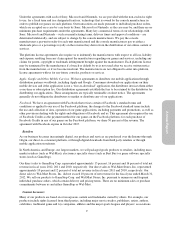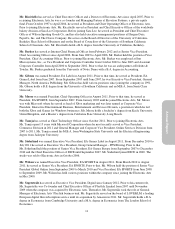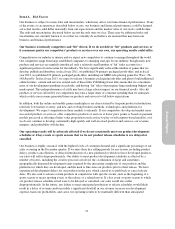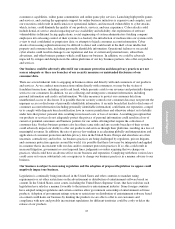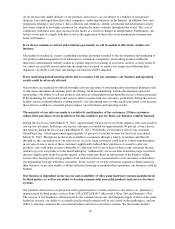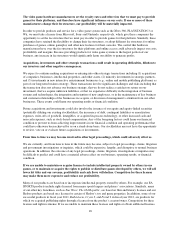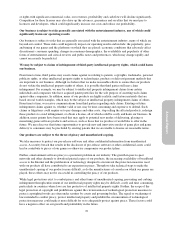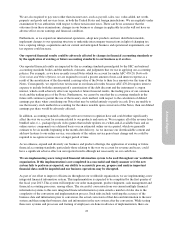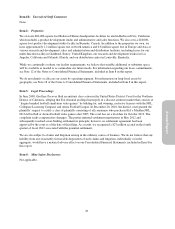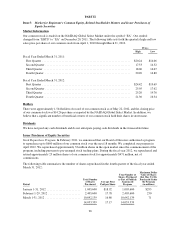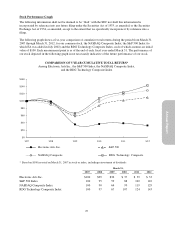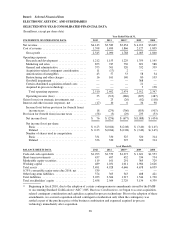Electronic Arts 2012 Annual Report Download - page 102
Download and view the complete annual report
Please find page 102 of the 2012 Electronic Arts annual report below. You can navigate through the pages in the report by either clicking on the pages listed below, or by using the keyword search tool below to find specific information within the annual report.The video game hardware manufacturers set the royalty rates and other fees that we must pay to provide
games for their platforms, and therefore have significant influence on our costs. If one or more of these
manufacturers change their fee structure, our profitability will be materially impacted.
In order to provide products and service for a video game system such as the Xbox 360, PLAYSTATION 3 or
Wii, we must take a license from Microsoft, Sony and Nintendo, respectively, which give these companies the
opportunity to set the fee structure that we must pay in order to provide games for that platform. Similarly, these
companies have retained the flexibility to change their fee structures, or adopt different fee structures for online
purchases of games, online gameplay and other new features for their consoles. The control that hardware
manufacturers have over the fee structures for their platforms and online access could adversely impact our costs,
profitability and margins. Because providing products for video game systems is the largest portion of our
business, any increase in fee structures would significantly harm our ability to generate profits.
Acquisitions, investments and other strategic transactions could result in operating difficulties, dilution to
our investors and other negative consequences.
We expect to continue making acquisitions or entering into other strategic transactions including (1) acquisitions
of companies, businesses, intellectual properties, and other assets, (2) minority investments in strategic partners,
and (3) investments in new interactive entertainment businesses (e.g., online and mobile publishing platforms) as
part of our long-term business strategy. These transactions involve significant challenges and risks including that
the transaction does not advance our business strategy, that we do not realize a satisfactory return on our
investment, that we acquire unknown liabilities, or that we experience difficulty in the integration of business
systems and technologies, the integration and retention of new employees, or in the maintenance of key business
and customer relationships of the businesses we acquire, or diversion of management’s attention from our other
businesses. These events could harm our operating results or financial condition.
Future acquisitions and investments could also involve the issuance of our equity and equity-linked securities
(potentially diluting our existing stockholders), the incurrence of debt, contingent liabilities or amortization
expenses, write-offs of goodwill, intangibles, or acquired in-process technology, or other increased cash and
non-cash expenses, such as stock-based compensation. Any of the foregoing factors could harm our financial
condition or prevent us from achieving improvements in our financial condition and operating performance that
could have otherwise been achieved by us on a stand-alone basis. Our stockholders may not have the opportunity
to review, vote on or evaluate future acquisitions or investments.
From time to time we may become involved in other legal proceedings, which could adversely affect us.
We are currently, and from time to time in the future may become, subject to legal proceedings, claims, litigation
and government investigations or inquiries, which could be expensive, lengthy, and disruptive to normal business
operations. In addition, the outcome of any legal proceedings, claims, litigation, investigations or inquiries may
be difficult to predict and could have a material adverse effect on our business, operating results, or financial
condition.
If we are unable to maintain or acquire licenses to include intellectual property owned by others in our
games, or to maintain or acquire the rights to publish or distribute games developed by others, we will sell
fewer hit titles and our revenue, profitability and cash flows will decline. Competition for these licenses
may make them more expensive and reduce our profitability.
Many of our products are based on or incorporate intellectual property owned by others. For example, our EA
SPORTS products include rights licensed from major sports leagues and players’ associations. Similarly, many
of our other key franchises, such as Star Wars: The Old Republic, are based on film and literary licenses and our
Hasbro products are based on a license for certain of Hasbro’s toy and game properties. In addition, some of our
successful products in fiscal year 2011, Bulletstorm,Crysis 2, and Portal 2 in fiscal year 2012, are products for
which we acquired publishing rights through a license from the product’s creator/owner. Competition for these
licenses and rights is intense. If we are unable to maintain these licenses and rights or obtain additional licenses
18



